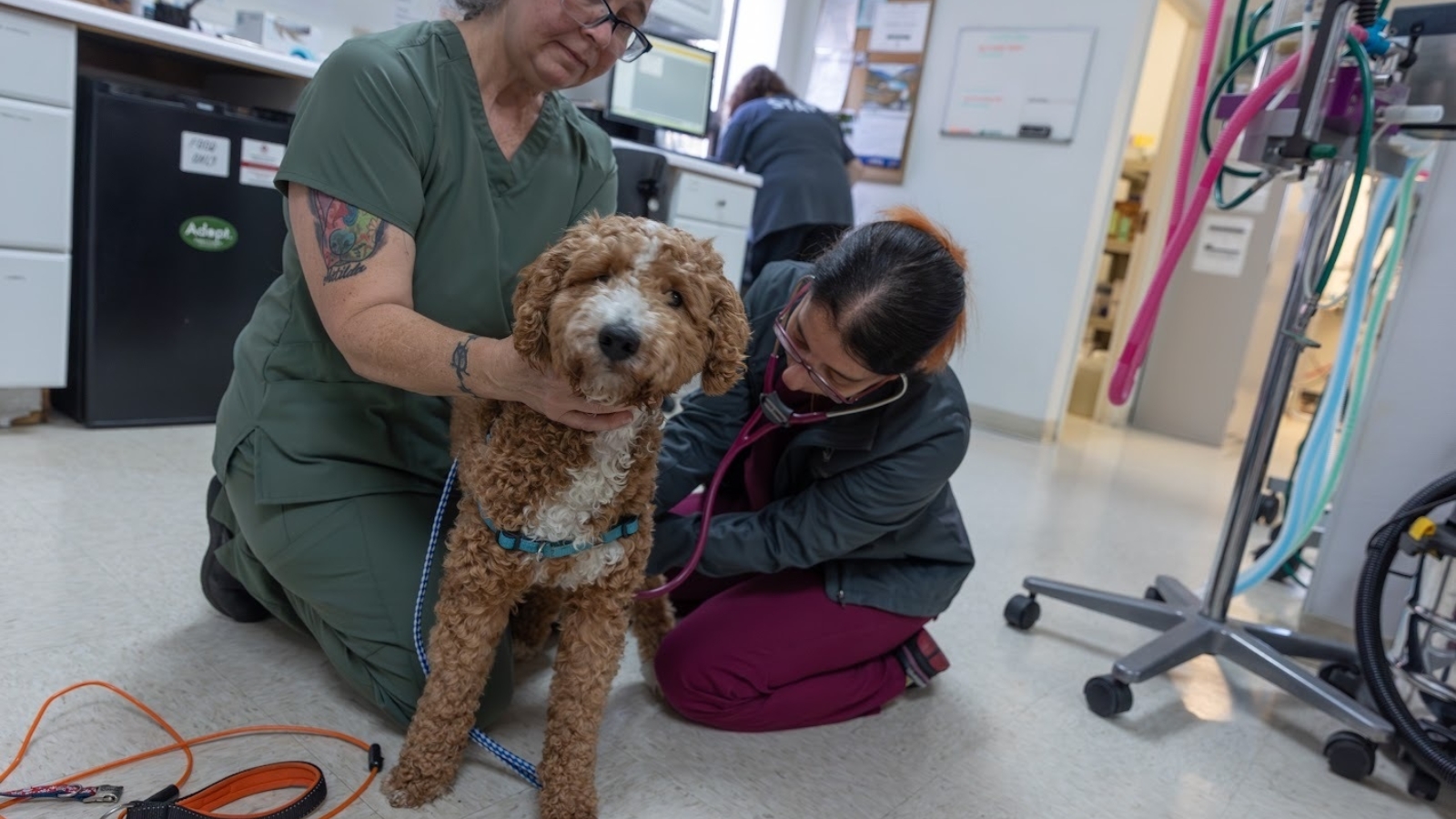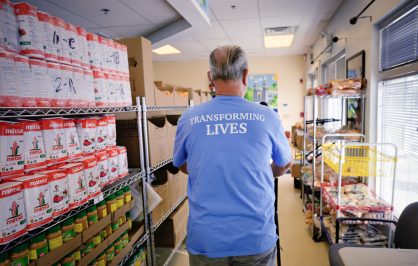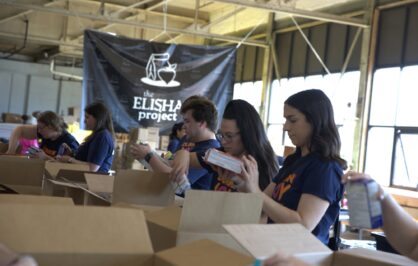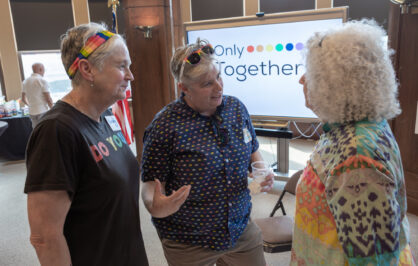
Media release
Rhode Island Foundation awards $550,000 in grants for animal welfare
We could not offer this help without the generous support of the donors who establish funds with us for this purpose. Their generosity – together with the dedication of our grantees – is improving the quality of animal care in Rhode Island.
The Rhode Island Foundation announced it has awarded $550,000 in grants to more than two dozen animal welfare programs across the state. The funding will support a range of uses including low-cost vet care for pets in low-income households, preparing animals for adoption and seal rescues.
“The delight that pets bring to our lives carries over into our own health and well-being. Keeping pets healthy and preparing animals for adoption are just more ways the Foundation helps Rhode Islanders lead healthier lives,” said David N. Cicilline, the Foundation’s president and CEO.
Donors have established a number of special funds at the Foundation that relate to the humane treatment and protection of animals. Collectively, these funds enable the Foundation to take a leading role on animal welfare issues through its Program for Animal Welfare (PAW).
PAW funds organizations that promote and provide humane treatment of animals or work more generally on the welfare of animals. Grants are for projects or programs that have a positive impact locally or statewide on animal care, education about the humane treatment of animals and animal welfare in general.
The largest grant went to the Potter League for Animals, which received $100,000 for work including subsidizing veterinary care at its Animal Care and Adoption Center in Middletown, surgeries at its Spay and Neuter Clinic in Warwick and buying medical supplies for its Pets In Need Veterinary Clinic in East Providence.
"We are one of Rhode Island's leading animal resource centers. We provide crucial veterinary care, shelter and second chances to animals in need. With our comprehensive approach, we not only provide services for animals under our care but also care for their guardians and our community," said Brad Shear, Potter's chief executive officer.
The Veterinary Medical Suite at Potter's Animal Care Center in Middletown received $30,000. Beyond fundamental services like spaying, neutering, vaccinations and microchipping, the facility provides essential, specialized surgeries. The care is expected to include 3,600 veterinary exams, 613 spay and neuter surgeries, 147 other surgeries and over 2,700 vaccinations this year.
"Over the past year, we have seen a growing demand for our services because of rising costs; we will continue to respond to this growing need with our unwavering dedication to providing exceptional care in a nurturing environment," said Shear.
The Spay and Neuter Clinic received $30,000 to provide low-cost spay/neuter services for pet owners who cannot afford them. The facility estimates it will perform procedures on over 6,000 dogs and cats in the coming year.
"Given our commitment to tackling companion animal and community pet overpopulation, this program is essential in helping us meet our goals and enhancing the well-being of our community's animals," said Shear.
The Pets In Need Clinic received $40,000 to subsidize a wide variety of veterinary services for the pets of disabled veterans of the U.S. armed forces and Rhode Islanders who receive public assistance.
"To qualify for the discounted services offered at Pets In Need, clients must meet specific criteria. We provide wellness, urgent care and surgical and dental procedures. By supporting the most vulnerable pet owners, we are keeping families together and for us, pets are part of the family," said Shear.
Animal Rescue Rhode Island (ARRI) in South Kingstown received $35,000 for work including performing substantial non-routine veterinary care for its shelter pets through its Jack’s Fund program, which is projecting the cost of care has doubled compared to last year.
“We attribute this to owners surrendering pets that have not received consistent veterinary care and to the stray pets taken in by municipal shelters and transferred to us. Those situations, and the increased cost of veterinary care, make it challenging for us to provide all the extraordinary veterinary care needed. Our work benefits the pets of owners needing to surrender them as well as hardship cases from area municipal shelters,” said Liz Skrobisch, executive director.
Friends of Animals In Need in North Kingstown received $35,000 for its Veterinary Care Assistance Program, which helps cover the cost of veterinary care for companion animals of low-income owners to help prevent the abandonment, surrender or euthanizing of a pet.
“Pets are treasured family members, providing solace and companionship. However, when owners encounter unexpected medical emergencies for their pets and have limited financial resources, they often feel overwhelmed. Some are forced to make the heartbreaking decision to surrender, euthanize, or abandon their pets. It's a devastating choice. Our organization steps in to fill this gap, offering vital financial assistance for veterinary care,” said Russ Shabo, executive director.
Historic New England received $8,720 to purchase educational material for Project CHICK, which teaches students about bird lifecycles and ethical animal husbandry. Students receive incubators and watch chicks hatch in their classrooms over a period of two weeks. After the chicks are transported to Casey Farm in Saunderstown, children can visit their chicks and learn the importance of ethical, organic farming methods for animal welfare and environmental sustainability.
“As climate change and population growth put increasing pressure on America's food supply, future scientists will need to find innovative ways to feed the country while improving sustainability. Project CHICK brings these pressing issues into classrooms across Rhode Island, inspiring a new generation of farmers, biologists, animal scientists, and environmentalists,” said Vin Cipolla, president and CEO.
The Norman Bird Sanctuary in Middletown received $9,500 for its Animal Ambassador Program, which enables the public to interact with wild and rehabilitated native animals. The funding will cover veterinary care, food and supplies for the birds that support Norman's educational programs.
“Our goal is to cultivate an understanding and appreciation for wildlife within our community. This program fosters an ethic of wildlife stewardship among the tens of thousands of adults, children and families who visit the Sanctuary and participate in our educational programs,” said Kaity Ryan, Executive Director.
Pet Refuge in North Kingstown received $16,886 to purchase six state-of-the-art cages to house cats at the shelter. The organization estimates the equipment will enable it to serve approximately 100 cats a year, based on the shelter's average length of stay of 21 days.
"They are the most comfortable cages a cat can experience with a living area and a separate, smaller area for the litter box. A cat likes to stay clean and have its litterbox in a 'separate room' from where they rest and eat," said Linda Stevens, president
The Providence Animal Rescue League (PARL) received $34,169 to support its Thrive Program, which offers low-cost vaccine clinics, microchipping, nail trims, flea and tick products, free spay and neuter services for cats and other resources to support the increasing number of intakes at PARL via transfer or diversion from Providence Animal Rescue (PAC).
"These services are vital in maintaining pet health, preventing illnesses or injuries, and aiding PAC in reuniting lost animals with their families. Moreover, increased vaccination and microchipping rates among dogs and cats benefit public health by curbing disease spread and ensures compliance with housing authorities' requirements for pet-friendly homes," Rebecca Baylies, executive director.
Rhode Island Parrot Rescue has been awarded an $18,500 grant to install an industrial generator at its new, expanded location in West Warwick. This power source is a vital addition for the safety of the facility’s resident parrots during severe weather or unexpected power outages. The recent move to a nearly 12,000-square-foot building on Washington Street—more than five times the size of its previous location—enables the organization to house more birds, while providing enhanced facilities to support its rescue and education programs.
“This generator will allow us to protect our flock during emergencies when power is disrupted, particularly in Rhode Island’s harsh winter months,” said Corrie Butler, facility director. “With this installation, we’ll be able to tackle other crucial improvements and focus on growing our rescue operations and expanding educational programs that engage the community.”
Rhode Island Pet Network received $6,000 to help low- and fixed-income Rhode Islanders cover the cost of life-saving or life-preserving care for their pets. In addition, the organization helps local shelters with the cost of specific medical cases.
"Many Americans are struggling to keep a roof over their heads and food on the table, as overall costs of living continue to rise. In Rhode Island alone, there are tens of thousands of very-low-income households. For many, one unanticipated vet bill could be the expense that pushes an already struggling owner over the precipice," said Jordan Bouclin, founder and executive director.
RIPN reports an increasing number of requests to assist with veterinary care costs, especially for surgeries such as amputations, cancerous tumor removals and treatments; life-saving emergencies such as intestinal blockages and stabilization after accidents; and quality-of-life preserving procedures, such as dental extractions.
"Companion animals are sentient beings, capable of feeling emotions, perceiving their environments, and experiencing happiness or suffering. As with humans, when pets are in medical distress, it is imperative that they receive treatment expediently, and it often proves the difference between life and death," said Bouclin.
The Rhode Island Society for the Prevention of Cruelty to Animals (RISPCA) in Warwick received $41,609 to support its hardship board program and to help low-income pet-owners with the cost of veterinary care.
The hardship boarding program allows pet owners who cannot afford typical boarding costs to be able to temporarily board their pet with the RISPCA at no cost. Owners typically face short-term hospital, nursing home or assisted living stays, or loss of housing.
"We often encounter situations where pet owners are unwilling to be admitted to a hospital or a treatment program or to accept housing until they have been able to make arrangements for their pets. By providing them with a short-term boarding option for their pets, individuals in crisis are relieved of the pressure to care for their animals so they can get back on their feet and then be reunited with their beloved pets," said Wayne Kezirian, president.
The RIVMA Companion Animal Foundation received $25,000 to help pet owners who are experiencing financial hardship to pay for veterinary care for their animals. The grant is expected to help about 200 pet owners.
“We provide pet owners with vouchers that can be redeemed for $125 in services at veterinary practices across the state. The vouchers can be used for a variety of treatments for pets, including routine vaccinations, exam fees, medication, and surgical procedures,” said Leslie Zwicker, executive director. "The important role that pets play in our lives, especially among those who are the most isolated, was highlighted throughout the pandemic. We want to ensure that every Rhode Islander has equitable access to essential veterinary services.”
The Foundation also received $3,500 on behalf of the Rhode Island Veterinary Access to Care Coalition (RIVACC) to create an informational website to respond to the needs of pet owners in the state. In addition to launching the website, the work includes distributing informational materials to veterinary practices, shelters, social service agencies, pet stores, food pantries, housing complexes and creating media kits for coalition members to use that will include images, QR code, draft letters, and material to use in their own social media, newsletters, and mailings.
“Working together, RIVACC members aim to make comprehensive pet healthcare accessible to all Rhode Islanders, promoting the health and well-being of their beloved animal companions,” said Zwicker.
Rustic Acres Wildcat Rescue in Chepachet received $1,712 for medical equipment to provide on-site care to the bobcats that are housed at the facility. The organization is outfitting an on-site clinic that it expects to be completed by early 2025.
"The fully equipped space where our veterinarian can provide routine and emergency care will be a game changer. Bobcats must be sedated when being transported, which becomes an additional risk and a great deal of stress for animals that are already extremely high strung," said Karle Busse, executive director.
Ten Lives Cat Rescue in Pawtucket received $10,000 to support its Spay It Forward program. Ten Lives will use the grant to give as many as 200 low-income cat owners vouchers that will reduce the cost of spay and neuter surgeries as well as rabies and distemper vaccines.
"On average, the cost to spay or neuter a cat at a private veterinary clinic is $200 to $500. Many people cannot afford the cost of these services, but want their cats to have long, healthy lives. Our program dramatically reduces barriers for cat owners by providing vouchers for spay/neuter and vaccination services for $35," said Melissa Rodas, executive director. “The voucher program helps reduce barriers to affordable spay and neuter services for those facing financial challenges."
Volunteer Services for Animals (VSA) received $10,000 to help pet owners with the cost of needed veterinary care, including spay and neuter procedures.
"We have continuously carried out statewide humane work for 45 years. The citizens, the taxpayers and the municipalities of our state benefit greatly from our work and volunteerism. Pet owners from all over Rhode Island come to us for financial assistance," said Joanne Rongo, chair.
The Wildlife Rehabilitators Association of Rhode Island in North Kingstown received $20,000 to build an animal enclosure and storage space. The enclosure will provide sensory isolation for particularly sensitive species of animals that can be substantially impacted in their rehabilitation if there is excessive light, sound or visual stimulation. Additionally, it will provide storage for equipment used for animal care.
"The primary goal is to expand our animal isolation capability, which increases our ability to take in, test and treat animals that have potentially transmittable disease or are extremely vulnerable to light and sound. Our work with these animals provides the state Department of Environmental Management with critical disease data that aids in the treatment of individual animals as well as larger disease transmission," said William Morrissette, executive director.
The Rhode Island Foundation is the largest and most comprehensive funder of nonprofit organizations in Rhode Island. Through civic leadership, fundraising and grantmaking activities, often in partnership with individuals and organizations, the Foundation is helping improve the lives of all Rhode Islanders.



